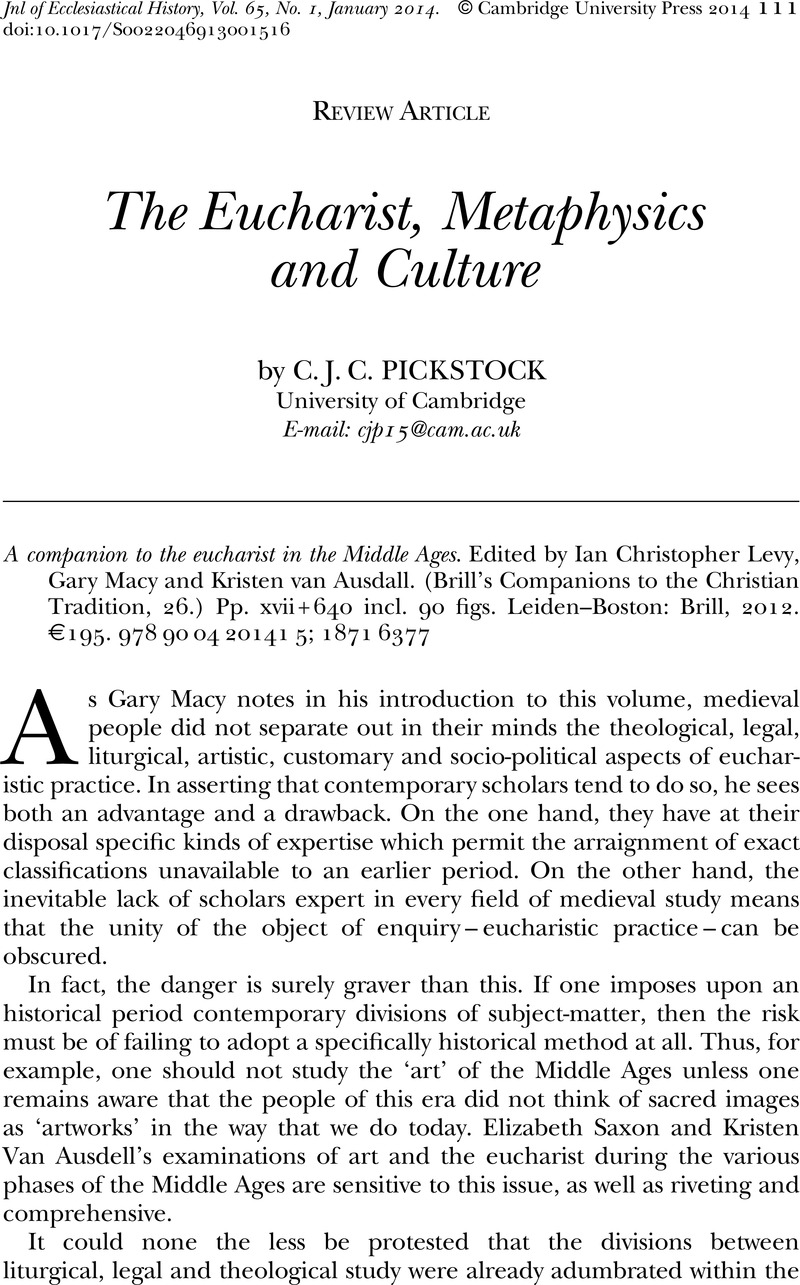No CrossRef data available.
Published online by Cambridge University Press: 13 December 2013

1 Agamben, Giorgio, The kingdom and the glory: for a theological genealogy of economy and government [Homo sacer II, 2], trans. Lorenzo Chiesa with Matteo Mandarini, Stanford, CA 2007Google Scholar.
2 I am indebted to Anna Gannon for drawing my attention to the sceattas, for providing useful bibliography and especially for letting me read her forthcoming paper, ‘The iconography of Series M, variant and the Agnus Dei', in M. Allen, R. Naismith and E. Screen (eds), Early medieval monetary history: studies in memory of Mark Blackburn, London, forthcoming. See also her ‘Coins, images and tales from the Holy Land: questions of theology and orthodoxy’, in T. Abramson (ed.), New perspectives: studies in early medieval coinage, Woodbridge 2011, 88–103, and The iconography of early Anglo-Saxon coinage (6th–8th centuries), Oxford 2003, 60, 83–4, 117–20, 133–4; Travaini, Lucia, ‘Monete e sangue’, in Valori e disvalori simbolici delle monete: i trenta deneri di Giuda, Rome 2007, 231–48Google Scholar; Colace, P. Radici, ‘Il Dio monetiere’, in Conii e scene di coniazione a cura di L. Travaini e A. Bolis, ‘Monete 2’, Rome 2007, 13–25Google Scholar; and Keynes, S. and Naismith, R., ‘The Agnus Dei pennies of King Æthelred the Unready’, Anglo-Saxon England xl (2011), 175–223CrossRefGoogle Scholar at pp. 180–1 nn. 13–14.
3 On the philosophico-theological developments which accompanied the shift from merchant to finance capital in the later Middle Ages see also Alliez, Éric, Les Temps capitaux, I: Récits de la conquête du temps, Paris 1991Google Scholar.
4 Flint, Valerie I. J., The rise of magic in early medieval Europe, Princeton, NJ 1991Google Scholar.
5 I am grateful to A. M. Milbank for this detail; we need divine grace, through the eucharist, and this comes by clergy defined by their possession of learning and their capacity to write, which is in turn underwritten by Christ as writer and written as Logos. See further The vision of William concerning Piers the Plowman in three parallel texts, ed. W. W. Skeat (Early English Texts Society [1886], 1954), B manuscript, passus xii, lines 70–104:
‘Ac grace is a gyfte of god · and of gret loue spryngeth;/ Knewe neuere clerke how it cometh forth · ne kynde witte the weyes …/ And namely clergye, for Crystes loue · that of clergye is rote./ For Moyses witnesseth that god wrote · for to wisse the peple,/ In the olde lawe, as the lettre telleth · that was the lawe of Iewes …/ The clergye that there was · conforted the womman./ Holykirke knoweth this · that Crystes writyng saued;/ So clergye is conforte · to creatures that repenten,/ And to mansed men · myschief at her ende./ For goddes body myȝte nouȝte be · of bred, withouten clergye,/ The which body is bothe · bote to the riȝtful,/ And deth and dampnacioun · to hem that dyeth yuel./ As Crystes carecte conforted and bothe · coupable shewed/ The womman that the Iewes brouȝte · that Iesus thouȝte to saue;/ Nolite iudicare, et non iudicabimini, etc./ Riȝt so goddes body, bretheren · but it be worthily taken,/ Dampneth vs atte daye of dome · as the carectes dede the iewes.
For-thi I conseille the for Crystes sake · Clergye that thow louye,/ For Kynde Witte is of his kyn · and neighe cosynes bothe/ To owre lorde, leue me; · for-thi loue hem, I rede;/ For bothe ben as miroures · to amenden owre defautes,/ And lederes for lewed men · and for lettred bothe […] / Al-though men made bokes · god was the maistre,/ And seynt spirit the saumplarye · and seide what men sholde write.’
6 de Lubac, Henri, Corpus mysticum: l'eucharistie et l'église au moyen âge, Paris 1949Google Scholar.
7 Agamben, Giorgio, The open: man and animal, Stanford, CA 2004Google Scholar.
8 Aquinas, Summa theologiae iii. 77. 1 ad 2.
9 Ibid.
10 Ibid. 2 resp.
11 Ibid. 3. resp.
12 Taylor, Charles, A secular age, Cambridge, MA 2007Google Scholar.
13 Kantorowicz, Ernst, The king's two bodies: a study in mediaeval political theology (with a new preface by William Chester Jordan), Princeton 1997Google Scholar.